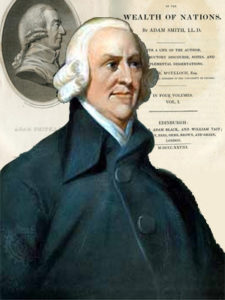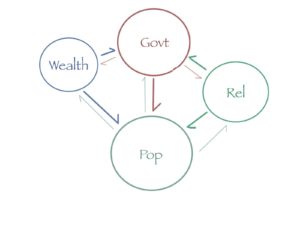
Adam Smith Father of Modern Economics
Adam Smith Did Not Write of Economics
Adam Smith, considered by many as the founder, or father, of modern economics did not write about economics in the book featured in the above graphic, his most famous work; he actually wrote about how to develop a modern society so he was truly developing a philosophy of control to best direct a modern society, in his estimation.
Herein is the issue, in the ancient societies nearly every aspect was under the control of the diety-monarch, who became just the monarch (or whatever title was appropriate for that culture). The medieval epoch was a transition period from the Ancient Kingdoms as Western cultures attempted to emulate and then consolidate control to project power. The Very Ancient Kingdoms and Ancient Kingdoms simply acquired territory to control larger numbers of people spreading their particular culture (truths). There were limits to this power because there were limits to the financial means and stability that could be obtained in this manner.
The Modern Era began to break away from the ancient model by segregating religion into a separate entity distinct from but useful to the state.The transition from the Medieval kingdoms to the nation-state was marked by a series of wars not so much over religion as it was over the control religion was to have over the Government. The RCC (Roman Catholic Church) exerted tremendous control over government but could not quite accomplish its goal of merging government and religion like the Ancient Kingdoms. The rise of Protestantism was facilitated by the emergence of new nation-states that needed the moral compass religions provided but without the strings of control that would challenge their development. Thus, Protestantism quickly floundered in the quagmire of state sponsored churches that gave them a monopoly changing them from persecuted churches into persecuting churches. After the Treaty of Westphalia the nation-state was defined and thus legitimized.
Adam Smith did not invent the ideas he espoused in his work but he did bring them together into a coherent philosophical context as he sought to develop the “ideal” society. This should be problematic for the Christian because the ideal society will be centered on Christ alone, His Word alone which is not possible in this present universe {even during the Millennial Kingdom period the vast majority of people will rebel against Christ’s rule resulting in the dissolvement of this present, physical universe (Re 20:7-10). Thus, any study of the “tangible means” of control that ignores the spiritual forces at work in this world errors; yet, it is these forces that control the men that seek to control the “tangible means” to control all men (Ep 2:1-3). Adam Smith was a philosopher who sought to develop a “better” society based on non-spiritual means proving he was not a Christian though he could be thought of as a “good man” though that would avail him little in eternity-future.

General Elements of the Modern Nation-State
Adam Smith relied on government to provide the environment that would allow commerce to develop that would raise the economic standard of everyone to strengthen society. He understood that the Mercantile system of the early industrial age/nation-state development period only stunted development and innovation. Though he used the term, “free market forces” he did not mean for them to be free of all government intervention. He saw the role of government as providing a “level playing field” for people to compete in which the Medieval period did not provide with its stratified societal levels that inhibited both the population and governmental development. He realized men would compete from his own desire to enrich himself but he also envisioned a society that would provide some means for those without means to gain aid to enter the work force/marketplace. In other words, he saw man’s sinful nature as the means to enrich man and to a certain extent he was correct but only as the society was also enriched by the Gospel. The schematic for the early Nation-State period would look something like this.

Government Grows Stronger as a Nation-State
Wealth and Religion Separate into Unique Spheres of Influence
Government grows stronger as a Nation-State as evidenced by the burst of exploration that occurred post Medieval Period. The first nation-states, Spain and Portugal, developed the means to obtain raw materials and markets for its wares. However, they still operated in the Ancient Kingdom model as they sought “riches” in order to quickly increase their wealth without industry, which was still in its infancy. However, with the entry of England and France into the nation-state realm colonies were developed not only for their raw materials but also for their use as markets for produced goods (Mercantilism). Adam Smith saw beyond this in his philosophy. He wanted a system that would not stifle either the population or the nation-state. During this period the wealth arose as a separate class contributing both to the development of industrialization and the growth of the nation-state. This resulted in the decrease of the influence of religion with its constraints via morality {though it often broke its own rules for its own power gains}.
The true contribution of Adam Smith is that he defined how the modern nation-state could control the “tangible means” of power to develop itself as it developed its citizenry. However, Adam Smith was as short-sighted as were the framers of the Article of Confederation. They believed that government would remain limited in order to benefit its citizenry and thus produce a more benevolent and ethical society, as they defined ethical. Government was never static. Satan is ever restless as the raging seas to make his case that God has erred in condemning him to eternal punishment. His case is that all moral beings God has created have sinned; i.e., man. This is the core of theodicy – that God has failed and must therefore accept His own responsibility and release everyone from condemnation. Therefore, Satan ever moves man close to world dominance to destroy the Gospel message and institute Satan’s message of universality or acquittal for all. Satan gets to control earth and God can wander off to stop bothering him.
The Civil War proved that government will not stop until it either is eliminated or controls those under its control. The development of economics is only another arrow in the quiver of Satan to give power first to the state, then to regionalism and then to globalism. Regionalism is nothing more than a collection of nation-states seeking to band together to control each other and their populations.

A Way Station on the Way to Globalism
Flying under the Banner of Fairness
However, the early industrial period grew beyond anyone’s vision, as did the power of the nation-states. Napoleon developed the first atheistic nation-state from the rubble of the French Revolution setting the standard that later became the Communistic empires. This will be the topic of our next discussion. The take-away message from this post is that Adam Smith had a vision of a utopian society that rested on the interaction between Wealth, Government, Religion and the Population. This balance could not be maintained in a lost, sinful world. Neither man nor Satan are willing to share power with anyone. The emphasis today on fairness is nothing more than a euphemism for control of the few over the many with their consent because of their limited knowledge; i.e., ignorance. The true commonality in all of this is the ignorance of people as to the means of this control. These posts are not designed to stop this process but to get people to think about what they do not know about the spiritual forces at work. Christians need to stop supporting lost philosophies that will only perpetuate myths that did not work in times past. Rather than trying to model this world into a utopia we are to spread the Gospel so people may accept Christ and be ready for eternity-future. Until such time Christians will continue to be dupes of Satan and the world-system.
